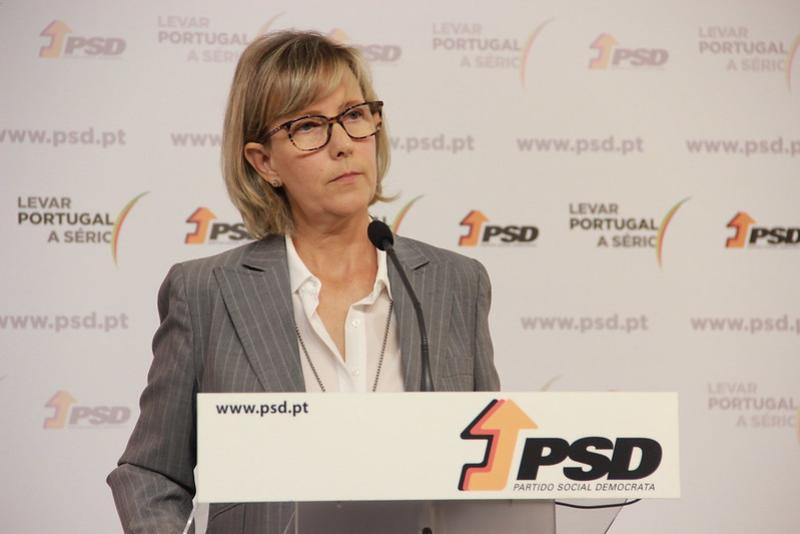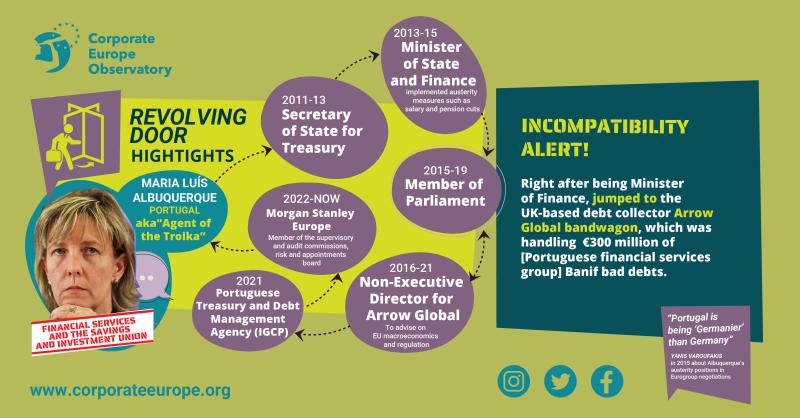Stay always informed
Interested in our articles? Get the latest information and analysis straight to your email. Sign up for our newsletter.

Maria Luís Albuquerque, Social Democratic Party (PSD), part of the EPP

Former Minister of State and Finance (2013-2015), and Secretary of State for Treasury (2011-2013) when she acted as Deputy Finance Minister in external matters, including alternate in Eurogroup and Ecofin. Albuquerque was first elected as an MP in 2011, then again in 2015 (serving as an MP until 2019) (source). Before that, she worked in various roles at the Treasury and Ministry of Economy (source), was Head of Issuing and Markets at the Portuguese Debt Management Agency, and Director of Financial Management of REFER, the railway infrastructure public company, as well as lecturing at Universidade Lusíada from 1991 to 2006; she has a degree in Economics and a Master’s Degree in Financial and Monetary Economics (source). She also served as Portugal’s governor to the EIB (whilst finance minister) (source).
After Albuquerque left office as Finance Minister in 2015 (due to electoral defeat for her party in government), in March 2016 she went through the revolving door to become a Non-Executive Director for Arrow Global, to advise on EU macroeconomics and regulation (source). However, she was still a serving MP until October 2019 (wiki) – and reportedly, took the Arrow Global job for €5,000 a month (on top of her MP salary of around €3,000 a month) with her party leader (former PM Pedro Passos Coelho)’s blessing (source). It was also reported at the time that her side-job for “UK-based debt collector” Arrow Global led to the Communists and Left Bloc asking “the ethics subcommittee to analyse parliamentary rules covering Albuquerque’s appointment in order to assess whether there is any incompatibility” due to the “the link between the €300 million of [Portuguese financial services group] Banif bad debts that Arrow is handling and Albuquerque's role as finance minister” (though former PM Coelho said their request for clarification was “just stirring up trouble for political point scoring”) (source). In 2018, it was reported that “London-based investment company Arrow Global which hired former Portuguese finance minister, Maria Luís Albuquerque, has bought [Portuguese property management company] Norfin for €17 million” – Norfin is an “asset and property management fund which manages around €1.5 million in investment”, while Arrow was described as a company that “uses sophisticated analytical models to identify, acquire and manage distressed assets and loan default, mainly from banks and other financial institutions” and which has Alberquerque as a non-executive board member and consultant for the group (source). UK Companies House shows that Alberquerque resigned from role of ‘Director’ at Arrow Global in October 2021 (source).
Politico reports that Albuquerque’s current jobs include being “On the supervisory board at Morgan Stanley Europe and the advisory boards of several Portguese universities” (Politico). Her role at Morgan Stanley began in 2022, joining the “supervisory and audit commissions, risk and appointments board at Morgan Stanley Europe” – with business news reporting in 2022 that she was also on the operational team of “private equity company Horizon”, and that when she left Arrow Group in 2021 she “returned to the Portuguese Treasury and Debt Management Agency (IGCP) which she had left in 2011” (source) – ie implying she’d already gone back through the revolving door to the public sector (even prior to her nomination as Commissioner).
Politico says Albuquerque “is seen as a skilled technocrat who could be in line for a prominent economic post” (Politico) and that when she was “finance minister at the height of the eurozone crisis, she handled the country’s banking turmoil and steered through reforms that were encouraged by the country’s creditors….An economist by training with years of experience in her country’s treasury, Albuquerque lost out to her party colleague Carlos Moedas for the nomination as Portuguese commissioner in 2014” (Politico). Reuters is a bit more critical, describing Albuquerque as an “austerity-era finance minister” who “led the country's austerity efforts a decade ago following an international bailout” and is “associated in Portugal with painful austerity measures such as salary and pension cuts” (Reuters). Opposition Socialist and Left Block lawmakers have variously described Albuquerque as "directly responsible for a series of severe measures for the country" and “an agent of the troika", referring to the EU, IMF and the ECB “which together provided the 78 billion-euro rescue package after Portugal nearly defaulted on its debt” (Reuters).
A new center-right minority government took office in April 2024, despite the rise of radical right populist party Chega (part of the far right Patriots for Europe in the EP) in the general election (Euronews). The government is led by Prime Minister Luis Montenegro, leader of the liberal-conservative Social Democratic Party (PSD, part of the EPP), which formed the centre-right Democratic Alliance with the right-wing CDS-PP party (also EPP) ahead of the election (source). Montenegro rejected the far-right Chega’s proposal to form a right-wing parliamentary alliance to secure an overall majority (and position Chega at the core of power), instead choosing a minority government (Euronews) and hoping for support from the centre-left Socialist Party (part of S&D) to pass legislation (Politico).
Upon entering office, Montenegro promised to deliver on his election promises of “lower taxes, higher salaries and pensions, and improved public services by making the economy more competitive and the government more efficient” as well as lowering corporate tax from 21% to 15% over the next three years. He also “vowed to quickly address shortcomings in public health care, especially long waiting lists for treatment, and a housing crisis, as well as resolve simmering disputes with police and teachers over pay and work conditions.” (Euronews).
It’s also been reported that the government’s plans “to lower taxes for the middle class and foster friendlier conditions for business” aim to lure back the 1/3 of “Portugal’s younger citizens who have migrated abroad in search of better-paying jobs”, and that it will present a “comprehensive plan to fight corruption and make the Portuguese government more transparent” (Politico).
The new government is considered to be very pro-European/ hoping to further strengthen Lisbon’s relationship with Brussels: four of the cabinet’s 17 ministers were previously MEPs including EPP Vice President Paulo Rangel (now foreign minister), while Montenegro’s chief of staff Pedro Perestrelo Pinto was previously in Portugal’s Permanent Representation to the EU (Politico).